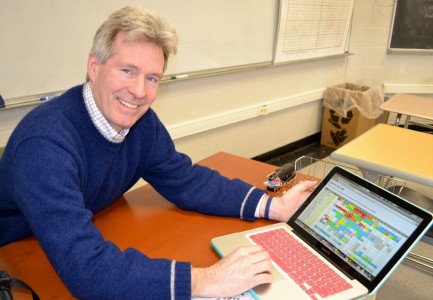
If you have a hard time completing a crossword puzzle in The New York Times, imagine what it’s like to write one. Now imagine selling that puzzle to a discriminating Times editor, who only accepts about 10 percent of submissions.
Then multiply the writing/selling/publishing process by 85.
That’s how often Huron High School math teacher Peter Collins has opened up The New York Times to find his byline on a crossword puzzle.
And that’s not to mention the 70 or so other puzzles he’s written for USA Today, The L.A.Times, and other publications.
“It’s just a great, creative release for me,” said Collins, who has taught at Huron for
35 years.
Only 17 other people have had more puzzles published in The Times than Collins, who notes that crossword puzzle constructors often have a math/music background.
In fact, a few years ago, one of his students, Kelsey Boes, asked for his help in constructing a crossword puzzle, which she eventually sold to The Times.
Collins believes she is still the youngest female to have done so.
Though Collins was an occasional crossword puzzler as a teenager, it wasn’t until he was working at Huron and met a fellow teacher who spent every lunch hour working on crossword puzzles that he really got into them.
“Then I thought, `Gosh, it’s fun to do them. But I think it would be even more fun to create one.’ So I took it on as a challenge, knowing nothing.”
And there was a lot to know.
In a 2009 New York Times Q & A, NYT crossword puzzle editor Will Shortz explained that he receives 75 to 100 freelance crossword submissions a week, and that about 100 different contributors appear in The Times each year.
Shortz said that after he fact-checks and edits the clues while looking for “freshness, playfulness, humor and overall balance of subjects,” he sends the puzzles to four test solvers before it ultimately goes to publication.
Collins and Shortz once played a puzzle together on the radio during an on-the-air taping of the NRP Sunday Puzzle. When Collins heard that Shortz would be visiting Ann Arbor during a fundraiser, he showed up and handed Shortz a puzzle he’d written on an index card.
To Collins’ surprise, Shortz said it was good, and that he’d use it on the air. Which he did.
Encouraged, Collins later sat down and wrote an entire crossword puzzle, which he mailed to Shortz.
“I waited a couple of months and then got a response back from him that said, very politely, `This is garbage. And here’s why.’”
And he outlined the rules Collins had broken that he didn’t even know existed.
He didn’t realize, for instance, that he needed an odd number of squares on a side, and that the grid should have 180-degree symmetry, with no more than one-sixth of grid black squares, and that there should be a theme.
Collins also bought Shortz’s book of favorite crossword puzzles.
“Just the cleverness of the themes really got me hooked,” he said. “I thought, `I gotta do this.’”
So he got some graph paper, pencil and dictionary and went to work.
Shortz rejected his next submission, but this time he told Collins he had promise.
Collins’ second puzzle came very close, but was a no go. Still, it was good enough for USA Today, which published it in 2005.
Shortly after that, Shortz began accepting his puzzles.
Collins estimates it takes about 8 to 10 hours to write a Sunday puzzle, which, at 21-by-21 squares, is larger than the weekday ones, which are 15-by-15.
Collins is paid $1000 for a Sunday puzzle, and $300 for a daily in The Times.
Other publications pay less.
“I used to play golf, and that was a hobby that cost me a lot of money,” said Collins, who years ago moved moved from graph paper and paper to crossword puzzle software. “This is a hobby that makes me a little money.”
Several blogs discuss that day’s NYT crossword puzzle.
“They can be pretty scathing,” Collins said, logging onto his computer to read some recent criticism.
“By now, it rolls off my back, especially from him,” he said, referring to the online “curmudgeon.”
His wife, Mary, has never marked one box in a single crossword puzzle, and can’t relate to his enthusiasm for the puzzles. Of their four daughters, who are ages 18 to 24, a couple have some interest.
About one-third of the puzzles Collins submits to Shortz are purchased. The ones Shortz doesn’t buy are usually then sold to other less discriminating publications.
Would Collins do it just for the fun of it?
“At this point, probably not,” he said. “I have to have some kind of justification for doing it.”
To see every puzzle Collins has had published in The NYT, go to:
http://www.xwordinfo.com/Thumbs?author=Peter+A.+Collins

Mr. Collins says that crossword constructors tend to be good at math and music. We know he’s a math teacher but I was wondering where the music comes in. Then I realized that the letters of Peter Collins can be rearranged to spell “prone cellist”. Aha!!
I always love to see “Peter Collins” on the top of my NY Times puzzle when I open the Arts section! Congratulations on the achievement! His puzzles are so witty and pun-ish, extra fun to solve! But I do miss the days he would share them with his students, pre-publication….Hopefully I one of my ‘students’ will have him as a teacher again soon, and share those puzzles with the parents!
And if you think his puzzles are good, he’s an even better math teacher! We are fortunate he’s a teacher!
He wrote the puzzle in today’s Los Angeles Times, too!
Outstanding math teacher… I had him 27 years ago!